Dear Friend and Reader:
Nearly everyone who lives in the Hudson Valley of New York is familiar with the land preservation efforts of Mohonk Preserve. The name has a national reputation, synonymous with forests, trails and the most famous rock climbing area in the Northeast — the Gunks. The Preserve describes itself as the responsible steward of its land holdings, estimated at 8,000 acres and expanding constantly.
 |
|
Skytop Tower in New Paltz, New York, symbol of Mohonk Preserve and the Mohonk Mountain House. Photo by Eric Francis.
|
When lawsuits involving Mohonk Preserve (annual revenue: $3M) occasionally make the news, their standard response is that the Preserve, a New Paltz-based nonprofit, tax-exempt 501(c)3 corporation, buys only from willing sellers and rarely engages in litigation.
In that light, it’s noteworthy that in late May, State Supreme Court Judge Christopher E. Cahill issued a decision after a nine-year lawsuit that involved Mohonk Preserve claiming title to 75 acres of land that the court held actually belonged to its neighbors, Karen Pardini and Michael Fink. [You may download and read the full decision by Judge Cahill at this link.]
More noteworthy is that Mohonk and its land-acquisition agents have sued Pardini and Fink four times trying to take their land, keeping them tied up in nearly nonstop litigation and appeals for 19 years. In all that time Mohonk has never once won a case against them or had one upheld on appeal; their batting average is zero.
Pardini and Fink’s 300-acre property is the largest privately held undeveloped tract on the Shawangunk Ridge. Located directly in Mohonk’s viewshed and developable as a commercial property, Pardini and Fink’s land is surrounded by the Preserve, which has contested nearly every boundary the two neighbors share.
The Preserve started as the Mohonk Trust in 1963, when the Mohonk Mountain House, a for-profit resort hotel, put the majority of its land into a conservancy, thereby taking it off of the property tax rolls — and with that savings, helping the hotel avoid bankruptcy.
While Cahill’s ruling only addresses one property dispute, there are numerous similar situations that are currently developing. Mohonk variously claims to have between 100 and 250 neighbors along its perimeter, 28 of whom have signed an open letter to the Preserve objecting to its land-acquisition tactics, including the use of adverse possession or squatter’s rights as a means of acquiring property, something commonly done by Mohonk.
“We respect the property rights and boundaries of the Mohonk Preserve,” the letter states. “We now ask the Mohonk Preserve to publicly state their willingness to respect the property rights and boundaries of all of their neighbors.”
Smitty’s Bar and Dude Ranch
Many old-timers in the Hudson Valley remember Smitty’s Bar and Dude Ranch on Clove Valley Road. It was owned by Wilbur Smith, known to everyone as Smitty. For more than a generation, Smitty’s was the place to hang out by the stream, ride horses, camp and go hiking. The bar, located in an old barn, featured live music and dancing in a magnificent rustic setting. Regulars and staff stayed in a little hotel upstairs. Smitty patrolled his land on horseback wearing a revolver on his hip.
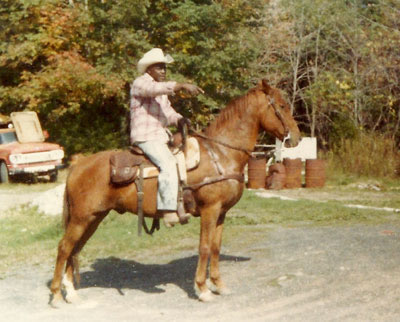 |
|
Wilbur Smith, known to everyone as Smitty, was a mythical figure in the Clove Valley from the 1950s through 1987.
|
The place was a mecca for countless hippies and nature lovers from the 1960s until Smitty sold the property to Pardini and Fink in 1987. In the years before he sold the place he was under increasing legal pressures from Mohonk that dated back many years.
Toward the end of his ownership he was in foreclosure and Mohonk was circling like a great white shark. Mohonk’s documents from that era indicate that they were urgently trying to get his land into the Preserve. Pardini and Fink came up with the funds to buy the place from Smitty, who went on to be a minister.
The couple closed the business and made a project of cleaning up the land from decades of overuse, removing old buses, trailers, campsites, dilapidated structures and 74 dump truck loads of trash and debris the first few years.
After nearly three decades of ownership, their only development of the property has been renovating the old bar and hotel into a home, and planting a garden. They have also maintained the labyrinth of trails and wood roads that spiral through the property, some of them dating back to before the American revolution.
The couple was first sued in 1994 by The Shawangunk Conservancy, which serves as a land acquisition agent of Mohonk Preserve. That suit unsuccessfully attempted to take 136 acres from them. State Supreme Court Judge Vincent Bradley said in his 1997 ruling on that case that Pardini and Fink had standing to bring a fraud action against the Conservancy. Had the Conservancy won, Mohonk said the land would have gone to them.
When I interviewed Mohonk’s longtime in-house surveyor, Norman Van Valkenburgh, about that lawsuit in 1997 as a reporter for Woodstock Times, he told me that he was after “the whole farm, whatever they [Pardini and Fink] own.”
He really meant it. For example, Pardini and Fink’s property includes about 200 acres on the north side of Clove Valley Road. In various lawsuits (including the most recent one), Mohonk or its agents have claimed every acre except for Smitty’s former house.
Fink said in a July interview that he and Pardini have spent more fighting lawsuits by Mohonk and its agents than they paid for the whole ranch. One can only imagine Mohonk’s legal bills.
Which is the Real King’s Lane Lot?
Land in the area where the lawsuit takes place is located within a land grant from 1770 called the Nineteen Partners Tract, which was subdivided into 19 sections or lots in 1799. [See map below — note that northerly is downward, opposite of a normal map.]
In 1841, the property boundary of a farm (called the Curran Farm) was drawn along a ridgeline laterally through Lots 1-5 and has not changed since. The Curran Farm may be forgotten, though a detailed history of its land transactions is lovingly preserved by the county deed office, tracking the details of title transfers going forward to the present.
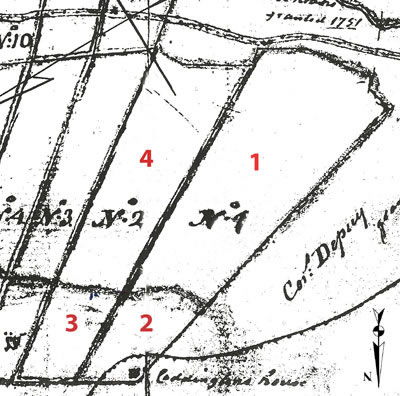 |
|
Note: Northerly is downward on this map! Section of a 1799 map showing the area where the lawsuit is taking place. South is toward the top of the map, where Clove Valley Road is shown (not marked). The lot numbers are in old script. Note that the old-style 1 looks like a 4. That is really Lot 1. There is a rough line (right above numbers 2 and 3) that divides Lots 1-5; that is a ridgeline that was the boundary of the Curran Farm, which was on the north (on this map lower) side of the ridge. That boundary has not been altered since it was first drawn in 1841. Here are what the red numbers pertain to: 1 is the 75 acres owned by Pardini and Fink but sold by Gloria Finger to Mohonk Preserve, which were never part of the Curran Farm; 2 is the real King’s Lane Lot, 26 acres owned by Gloria Finger, which was once part of the Curran Farm; 3 is lands formerly belonging to John I. Davis, located east of the King’s Lane Lot, and once part of the Curran Farm; 4 are lands currently belonging to Pardini and Fink, which were part of Smitty’s and in the old days were never part of the Curran Farm.
|
In Lot 1, the ridgeline currently divides the properties of Pardini and Fink (and the former Smitty’s Dude Ranch) from their neighbor, Gloria Finger. The lot is narrow and long. Finger owns the 26-acre tip at the north end of Lot 1, land known since the 1800s as the King’s Lane Lot, because an ancient road called the King’s Lane leads into it. The King’s Lane Lot was once part of the Curran Farm.
Pardini and Fink’s land includes 75 acres at the south end of Lot 1, on the other side of the ridge, close to Clove Valley Road. Their land was never part of the Curran Farm.
In 1994, Mohonk ‘purchased’ for $82,000 a deed for that 75 acres from Gloria Finger, falsely claiming it was the King’s Lane Lot. In other words, Mohonk bought the land from someone who didn’t own it.
The transaction was arranged by Robert K. Anderberg, who served on Mohonk’s board of trustees from 1981-1987. He went on to become general counsel to both the Open Space Institute and the Shawangunk Conservancy.
Anderberg has purchased land from non-owners before. In an earlier land transaction that resulted in litigation, Anderberg posed as a notary and with Van Valkenburgh, ‘purchased’ land from Smitty’s ex-wife Mary Lue Smith long after her ex-husband had sold the ranch to Pardini and Fink.
Knowing that she used to hold deeds in her name for her husband, they told her she didn’t know she still owned some land somewhere up on the ridge and paid her $5,000 for a quitclaim deed, releasing any interest she might have to them. The Shawangunk Conservancy then sued Pardini and Fink, claiming the nonexistent interest as its own. That’s the case where the judge said the couple had standing to bring a fraud action.
Anderberg’s plan to acquire the 75 acres on Mohonk’s behalf dates back to a March 24, 1993 memo from Anderberg to Van Valkenburgh, and Glenn Hoagland, Mohonk’s executive director. In that memo, Anderberg writes, “One of the landowners on Rock Hill, a Gloria Finger, is interested in selling a portion of her acreage to the Mohonk Preserve.”
Testimony from other lawsuits indicates that Anderberg was acting in his capacity as general counsel to the Shawangunk Conservancy, the land acquisition agent for Mohonk.
 |
|
Mohonk is in the background of everything in the central Hudson Valley, and is visually synonymous with New Paltz. Photo by Eric.
|
To complete the ‘sale’, a survey map of the 75 acres of Lot 1 was prepared and certified by Van Valkenburgh, the longtime in-house surveyor for Mohonk, which in effect slices off a flank from Pardini and Fink’s land and claims it for Mohonk.
Finger ‘retained’ the 26 acres she really owned — she gave up no land in the deal.
Mohonk filed the map with the county and used it to get Planning Board approval for a subdivision from the Town of Rochester, ‘dividing’ the two sections of Lot 1 that have been separate since 1841. That is when the Curran farm boundary line was drawn, bisecting Lots 1-5; there have been different owners on either side of that line since it was originally drawn.
The same map was used to secure title insurance from First American Financial of Santa Ana, CA. Title insurance is a form of coverage that protects the buyer in case it turns out the purchased land was not actually owned by the seller.
The Preserve then brought a lawsuit in State Supreme Court against the actual owners of the property, Pardini and Fink, attempting to get the courts to affirm what it claimed was “record title.” The litigation was paid for by First American, which now must either sponsor an appeal or reimburse Mohonk for its cost of purchase.
A First American spokesperson I spoke to in July had no official response but seemed surprised when I informed her that the company was the plaintiff, not the defendant. Title insurance carriers rarely prosecute lawsuits. They are usually the ones sued by others.
While it may seem that Gloria Finger tried to trick Mohonk into buying land that she didn’t really own, it was Anderberg — an attorney — who arranged the transaction on Finger’s and Mohonk’s behalf. This is apparently a routine activity for him. In a recent interview he told a reporter, “I’m involved with conservation transactions and dealing with landowners, many in Ulster County.”
Yet Fink says that Finger knew he and Pardini were the real owners of the land at that end of Lot 1. The King’s Lane Lot is landlocked; it has no road access except for the King’s Lane, which is more like a wide trail. Since she had no other way to get a car onto her property, Finger once approached Fink and Pardini to buy a right-of-way onto her acreage through Pardini and Fink’s portion of Lot 1. She ultimately withdrew the idea because the distance was too great and the terrain too steep to make a driveway practical.
 |
|
Ulster County Courthouse, where the lawsuit took place before State Supreme Court Judge Christopher Cahill. Photo by Eric Francis.
|
Then two years later Finger ‘sold’ that same land, owned by Pardini and Fink, to Mohonk, collecting $82,000 that she reportedly used to cover the legal bills for a prior lawsuit against another neighbor, the Cabral family.
In trying to prove that a smaller 26-acre piece of land was a neighboring 75-acre tract, Mohonk presented conflicting theories that in effect attempted to rearrange the ownership history along that section of the Shawangunk Ridge.
Over nine years of litigation, the court heard from 30 witnesses (eight of whom were Mohonk’s), reviewed 100 exhibits and read 1,299 pages of trial testimony. After all of this, Judge Cahill ruled May 29 that Mohonk Preserve had no claim to the 75 acres in question.
The court rejected every single claim made by Mohonk Preserve and its attorney, John Connor of Hudson. It accepted every fact and argument presented by Pardini and Fink and their attorney, Sharon Graff of Kingston.
The Case of the Moving Mountain
As is true many places, rural land along the Shawangunk Ridge is often described in the deed record by the neighboring properties. These are called adjoiners. Once something is described by its relationship to adjacent lands in all directions, you know where it is and you can follow the deeds to who holds title in the present.
No two parcels of land have all of the same adjoiners; each is unique. This is why adjoiner descriptions are so dependable. Your land describes that of your neighbors; their land describes yours.
Change any one adjoiner description and you have to rearrange the descriptions of every property in the area, since they all depend on one another.
It’s a little like turning a Rubik’s Cube. When you turn any one section, you simultaneously rearrange the patterns on four sides of the cube and shift the orientation of the other two. You cannot just move one square on the cube.
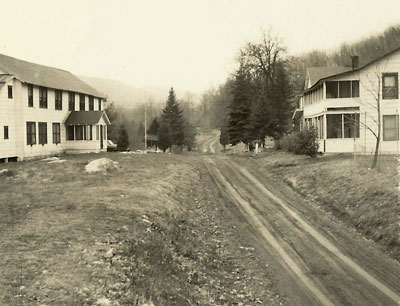 |
|
Smitty’s Bar and Dude Ranch as they appeared in the 1950s. Clove Valley Road was not paved at the time. The structure to the left is the bar and hotel, an old barn now renovated into the home of Pardini and Fink. The structure to the right was Wilbur Smith’s home.
|
At the trial, Pardini and Fink pointed out that Mohonk failed to explain why its claim to the 75 acres was missing many necessary adjoiners and that it listed others not called for by the deed record.
One example involves land formerly owned by John I. Davis in the 19th century, now called the Davis parcel. The real King’s Lane Lot — the 26-acre one owned by Finger — calls for Davis as its eastern adjoiner.
But Mohonk claimed that Davis was next to the 75 acres owned by Pardini and Fink, which it is not. To do this, they had to pretend that the adjoiners for the real King’s Lane Lot would work simultaneously for that lot and for the 75 acres they were claiming, and where it really was. In other words, Mohonk claimed that the Davis parcel existed in two places at once.
In Van Valkenburgh’s survey of the 75 acres that was used to make the purchase and secure title insurance, he accurately lists Pardini and Fink as the eastern adjoiner.
Then in court, Mohonk tried to claim that the John I. Davis parcel was the eastern adjoiner to the 75 acres, in effect attempting to kick Fink and Pardini off of even more of their land. Davis is nowhere to be found in Pardini and Fink’s chain of title, for a good reason. The Davis parcel is located east of the real Kings Lane Lot, not the 75 acres that Mohonk was pretending was the King’s Lane Lot.
That Van Valkenburgh originally listed Pardini and Fink as the eastern adjoiner to the 75 acres in the survey used for the purchase and title coverage proves he knew Davis was not located there and that he knew who the real owners of the 75 acres were. Doing a survey involves researching the ownership history of each adjoiner. But he had another reason to know the real history: he had been surveyor and expert witness in every prior lawsuit against Pardini and Fink. There are documents in the record demonstrating that Van Valkenburgh has researched the ownership of Lots 1 through 5 back to the dawn of time; he knows exactly who owns them.
At trial, Mohonk failed to present a witness who had actually done a survey of the property it was claiming.Notably, Van Valkenburgh was not called as a witness by Mohonk to tell the story of his survey, which would be pro forma — an expert testifies to the technical work he’s done. Instead, he sat in court nearly every day of the trial and assisted Mohonk’s legal team.
 |
|
Coxing Entry to Mohonk Preserve along Clove Valley Road, about a mile from the land involved in the lawsuit. Photo by Eric.
|
Had he been called as a witness, Pardini and Fink’s lawyers would have asked him to explain how the Davis parcel got up and walked down the mountain.
As for the King’s Lane, the ancient road which seems curiously left out of this whole saga: it follows the ridge along the Curran Farm boundary, leading into the King’s Lane Lot itself — along the north end of the ridgeline and the John I. Davis parcel, far from Pardini and Fink’s land. Its place on the landscape and in history is undeniable.
Presented with these and other facts, Judge Cahill concluded that Finger never owned the land Mohonk had ‘purchased’ from her, and ruled that Pardini and Fink hold both proper title and common law possession of their land, calling theirs the “more coherent” of the two descriptions of ownership history, current title and usage — an understatement on the judge’s part.
In late July, I went to Mohonk Preserve to interview its top leaders — Glenn Hoagland, the executive director, Ronald Knapp, the board president, and Gretchen Reed, a lawyer who serves as the Preserve’s publicist.
They spent an hour and 20 minutes attempting to convince me that it was really Michael Fink who was trying to take their land from them. Mohonk’s execs also claimed that Pardini and Fink didn’t believe they owned the 75 acres that the judge determined were part of the couple’s own property. This is where the interview started to feel like a Saturday Night Live sketch.
Fink and Pardini didn’t believe they owned it? That’s what they said — the logic here being: they didn’t know they owned it, so we claimed it. Or, we claimed it before they claimed it. Or we filed a map that they didn’t know about, so that makes it ours.
 |
|
Redwood roots that soaked in the Pacific for more than a century have found their way to the land, transported there by Jim Dowd, who sculpted the elf, too. Photo by Eric Francis.
|
Throughout the meeting, none of the Preserve’s officials would answer any of my questions about why the adjoiners to the land to which they were claiming to hold a deed did not match known reality on the ground. They claimed not to remember the details and said they didn’t want to “re-litigate” the case in their conference room. They put out enough spin to make it sound like there was another side to the story — one that they could not explain or support factually.
Mohonk recently said that its board of directors had voted to appeal Cahill’s ruling. In a July 5 letter to the Preserve’s members and supporters, Hoagland and Knapp claimed that Mohonk still owns the 75 acres. They trivialized Judge Cahill’s decision as being just three pages long when in fact it’s 90 pages, most of it straightening out the deed history in accordance with what Pardini and Fink’s attorney had presented at trial.
Hoagland and Knapp wrote, “The continuing litigation […] underscores the importance of the Preserve’s critical land protection work, which deals not only with acquisition of land and conservation easements but with the perpetual protection of lands in our care. With your continued support, we will remain steadfast in our 50-year heritage of saving the land for life.”
Sure sounds good.
Lovingly,

For the Grandmothers.
This week’s news briefs were written and researched by Karlie Cole, Gale Greenwood, Alison Beth Levy, Amanda Painter, Susan Scheck, Beverly Spicer, Carol van Strum and your friendly neighborhood news editor, Eric Francis. Fact checking support by Jessica Keet, Alex Miller, Len Wallick and our Thursday night Fact Checker list. If you want to help with that project, please write to me.
![]()
Stars for August: Fire and Water
August combines the passion of the fire signs with the empathy of the water signs. Let’s start with the two lunations — the Leo New Moon of Aug. 6 and the Aquarius Full Moon of Aug. 20.
The Leo New Moon is nothing short of a magnificent chart. In the Northern Hemisphere, the New Moon takes place at Lammas or Lúnasa — the First Harvest. It’s the midpoint between the summer solstice and the autumn equinox, one of the eight most potent moments of the solar year. Those points include the solstices and equinoxes (the quarter days) and the midpoints of those locations (the cross-quarter days).
 |
|
Fire spinning in Krakow, Poland. Photo by Eric Francis.
|
The New Moon is conjunct the asteroid Vesta. The brightest asteroid, and also one of the most complex, it describes some of humanity’s most profound gifts and its deepest shadows. Her theme is service, though when Vesta is in the picture so prominently, there’s the question of whether the needs of one who offers himself or herself are met. Vesta seems to insist on total devotion, though we walk the line between that and sacrifice.
Vesta’s symbol is a chevron with a flame and is symbolic to the goddess Vesta, the Vestal Virgins of Roman times, and the sacred flame they would tend and never let go out. The real devotion that the astrological Vesta represents is to the inner fire that we all carry, the creative and sexual passion at the core of everyone.
Yet because our culture tends to corrupt the topics that Vesta honors, she can represent a diversity of shadow themes — shame, for instance, or the obsession with appearance and glamour — and that in turn can point to where we are distracted from true inner devotion.
In this chart, the Vesta New Moon is square the asteroid Psyche in Scorpio, calling for a real inner investigation of our erotic psyche, which connects directly to our sense of existence. This connection is often overlooked. Vesta is shining a light on this inquiry, opening up access to the sacred space of self.
The Aquarius Full Moon takes place on Aug. 20. It’s the second Aquarius Full Moon, since the Sun and Moon also opposed each other immediately after the Sun entered Leo on July 22. The Sun and the Moon reach opposition at the end of the Sun’s run through Leo, giving the event an edgy quality. This is often true of the Sun’s last days in a sign, though especially if there is a significant solar-lunar event right then.
 |
|
Leo New Moon conjunct Vesta, set for Kingston, NY.
|
Minor planets are involved — the Sun is conjunct Ceres and the Moon is conjunct Nessus. The subject matter here involves the ways in which complex emotions become subject to power struggles. We are so accustomed to this in our relationships that many people will tell you it’s normal: for example, the notion that if you have deep feelings you can expect someone to use them against you.
There is a special caution to be aware of power dynamics between mothers and daughters. These can be difficult to identify, especially if the dynamics have continued unconsciously for generations. Discerning that will take some special honesty or a knack for the obvious. Honoring the independence of young women, including the right, responsibility and necessity to make mistakes, is an essential message of this chart.
In the background of this astrology is the grand water trine. Jupiter is now in Cancer; so too is Mars. Chiron and Neptune are in Pisces. Saturn and the North Node are in Scorpio.
The message: everything has an underlying emotional dimension, and that’s the one that will dominate the experience of being alive. Emotional contact is essential, which means getting these subjects off of the intellectual level and liberating the emotional level from our obsession with obsession.
Water in any form moves; where there is a blockage, look for where it’s necessary to let go and let flow. The grand water trine needs to be handled consciously and carefully — it’s like a whirlpool. It’s easy to get drawn into, and difficult to get out of, so you must be careful as you experience and express your emotions.
I suggest you invest extra energy into understanding what you are feeling and what other people are feeling, remembering that there is a difference between the two. Honoring that difference is called having boundaries, though it’s more often said than done. The month begins with a beautiful New Moon encouraging you to define your own space, set your purpose and recognize that you cannot help others if you don’t help yourself.
That said, being of service to others and to humanity can be a healthy way into a larger world and into true participation. It’s a way to honor the existence that we all share, and the mutual presence we all thrive on.
![]()
Garry Davis: The World is My Country
We don’t care what flag you’re waving
We don’t even wanna know your name
— John Lennon
Most people have not heard of Garry Davis, but many have wondered about the key concept that defined his life: what if there were no countries?
 |
|
Garry Davis as an earnest young man, with one of his self-issued world passports.
|
One spring afternoon in 1948, Davis, a former Army pilot, walked into the American embassy in Paris, renounced his citizenship and declared himself a citizen of the world. He believed that if there were no nation-states, there would be no wars.
Davis died last week at the age of 92 in Burlington, Vermont, which he called home for the past 20 years. He may not have been the first person to ask why we need national boundaries, but he was one of the most successful at transcending them.
He somehow traveled extensively using a self-made passport, and his organization, the World Service Authority, issued more than 2.5 million World Government documents. He lectured on college campuses around the world, spreading the gospel of a world without nationalism.
“The nation-state is a political fiction which perpetuates anarchy and is the breeding ground of war,” he told The Daily Yomiuri, an English-language newspaper in Japan, in 1990. “Allegiance to a nation is a collective suicide pact.” He worked colorfully and tirelessly for 65 years to promote the idea that all persons born on our planet should have the right to travel anywhere on Earth without restriction.
Jailed many times for related, but somewhat innocuous infractions, Davis risked his own freedom to insist that all persons everywhere have universal equal rights and liberties, personal sovereignty, and total freedom to roam the Earth at will and live wherever they choose.
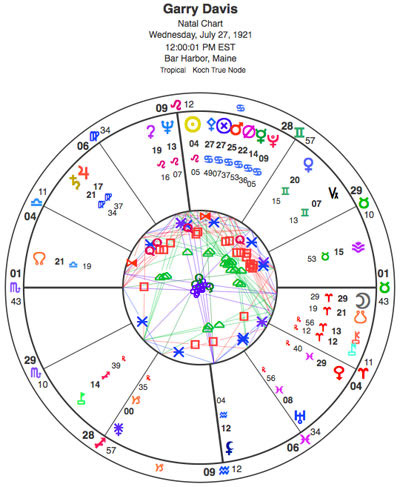 |
|
Noon chart for Garry Davis. Noon charts work really well when you don’t know the birth time. The first question nearly any astrologer would ask about Davis is: what’s in his 9th house? Many, many planets.
|
He created a manifesto outlining his philosophy and One World doctrine, the “Universal Declaration of Human Rights.” His best-known book, The World is My Country, was published in 1961. Many others followed.
Davis was born with the Sun in Leo, arranged in such a way that by the time he was 14 years old, he had experienced many, many events that turned him into a worldly person.
He had several events with several planets in Cancer, the sign of home and security. These included Pluto, Mercury, Mars and the asteroid of politics and government, Pallas. These planets represent a kind of grounded self-sufficiency.
He had plenty of Aries, which gives a dauntless, pioneering spirit: a conjunction of Chiron and Nessus, plus the South Node and (though we don’t know his birth time) his Moon in the last degree of that sign.
One of the most distinguishing features of his chart was being born during the Jupiter-Saturn conjunction of 1921, which was in Virgo. Big events and big people emerge under this conjunction; each time they happen represents the turnover of a new phase in history.
No doubt he saw his life that way. Read more about Garry Davis in his New York Times obituary, which made page one of the Sunday paper this week.
![]()
Ambassadors to Islamic Countries Gone Fishin’
U.S. embassies in a slew of Muslim countries will close on Sunday due to what’s being billed as a credible and serious security threat, many news outlets are reporting Friday.
 |
|
Brings back memories…
|
The embassies will close in response to “a specific threat against a U.S. embassy or consulate,” according to a senior U.S. official, who told ABC News that there was a “concerted effort” to target an embassy or consulate in a Muslim country. “We just don’t know which one,” the official said.
“There could be other targets, not just embassies,” another U.S. official said. The threat is considered to be throughout the Middle East, North Africa and South Asia.
Some of the biggest U.S. embassies will close, including those in Egypt, Iraq, Qatar, Bahrain and Kuwait, where tens of thousands of U.S. troops are based. The U.S. embassy in Afghanistan will also close.
So will embassies in Dhaka, Bangladesh; Amman, Jordan; Muscat, Oman; Riyadh, Saudi Arabia; Algiers, Algeria; Abu Dhabi, United Arab Emirates; Sana’a, Yemen; and Tripoli, Libya, according to security warnings issued by those embassies. Two consulates in Saudi Arabia will also close, in Dharan and Jeddah, as will a consulate in Dubai, United Arab Emirates.
![]()
Gut Reaction: Why is Roundup Toxic?
Monsanto and the rest of the chemical industry assert that Roundup, also called glyphosate, is only minimally harmful. But new research is demonstrating exactly why the world’s most popular plant killer is seriously toxic — which is less about what it does to people and more about what it does to the bacteria that we rely upon to stay healthy.
This is troubling given the cycle of an ever-increasing volume of crops engineered to withstand Roundup, leading to ever-increasing use of the chemical.
 |
|
Bacteria are your friends.
|
Medical science is finally figuring out how important intestinal flora are to the immune system. The trillions of bacteria resident in our intestines don’t just break down food — they synthesize many nutrients and support the body’s ability to keep disease in check.
Microbes play other vital roles in our biology. A recent New York Times Magazine cover story described them as a second genetic code, one that is fragile, in constant flux and subject to environmental factors.
“Our resident microbes also appear to play a critical role in training and modulating our immune system, helping it to accurately distinguish between friend and foe and not go nuts on, well, nuts and all sorts of other potential allergens. Some researchers believe that the alarming increase in autoimmune diseases in the West may owe to a disruption in the ancient relationship between our bodies and their ‘old friends’ — the microbial symbionts [mutual cooperators] with whom we coevolved,” Michael Pollan wrote in that article.
It’s in this context that Roundup is especially dangerous. While the industry claims that the herbicide has little effect on mammals, it’s designed to kill plants — and the plants that it kills include intestinal flora and other microbes.
A recent study conducted by Anthony Samsel and Stephanie Seneff, researchers at MIT, found clear evidence that glyphosate disrupts gut bacteria. In addition to the amino acid effects that Monsanto acknowledges it affects, researchers found that it also suppresses essential enzymes necessary to the health of intestinal flora. In other words, Roundup disrupts intestinal flora and compromises our immune systems — and does a lot more damage than that.
The MIT study concluded that the consequences of the effects of glyphosate on human gut bacteria “are most of the diseases and conditions associated with a Western diet, which include gastrointestinal disorders, obesity, diabetes, heart disease, depression, autism, infertility, cancer and Alzheimer’s disease.”
The researchers note that 80% of genetically modified crops, particularly corn, soy, canola, cotton, sugar beets and most recently alfalfa, are specifically targeted towards the introduction of genes resistant to glyphosate, the so-called ‘Roundup Ready’ feature.
That means that the crops will contain more Roundup, particularly now that the patent has expired and anyone can manufacture it. In light of this, the U.S. Environmental Protection Agency (EPA) just raised the allowable residue limits of glyphosate in human and animal food. Under the ruling, the allowed glyphosate level in animal feed will rise to 100 parts per million (ppm) and 40 ppm in oilseed crops.
From Monsanto’s perspective, as ever, the solution is not to lower exposures but to say that more exposure is less dangerous.
![]()
Tiny Plastic Pellets Contaminating Great Lakes
Did you know those little microbeads in your beauty products were made of polyethylene plastic? They are, and enough of them are finding their way from your bathwater to the Great Lakes (and presumably, other waterways) to make them a significant source of pollution.
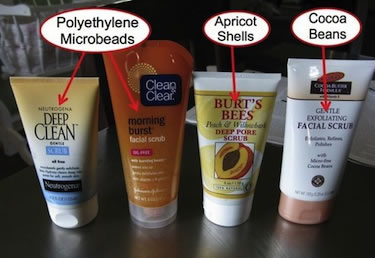 |
|
It pays to read those labels. Are you using facial and bodycare products with plastic or natural, biodegradable exfoliating ingredients? Photo: 5 Gyres Institute.
|
Researchers with 5 Gyres Institute, a non-profit California-based environmental activist group, collected samples from lakes Erie, Superior and Huron last summer and found large quantities of round, plastic pellets, less than a millimeter in size. Similar pellets have already been found in ocean water. The pellets are used in products that wash away dead skin, such as body washes and scrubs.
“They matched the same size, color, texture and shape of the microbeads found in popular consumer products,” said the group’s executive director, Marcus Eriksen.
The Great Lakes are the largest surface freshwater system on Earth. Fish in the lakes can easily confuse the pellets with natural food, becoming a hazard to themselves and humans who eat the fish. There’s no easy way to remove the pellets; plastic does not break down, drift to shore, or absorb chemicals that would allow it to drop to the lake bottoms.
The group presented its findings to Johnson & Johnson and Proctor & Gamble Co. P&G plans to phase out the beads by 2017, while Johnson & Johnson told the group it has already begun the phase-out of polyethylene microbeads in their existing products and is looking for environmentally friendly substitutions.
“We won without having to go through a legislative battle,” Eriksen said, “which no one wants to do.” A resourceful use of time and energy all the way around — and a lesson in examining environmental impact before products go to market.
![]()
Not Exactly “Sex and the Art of Motorcycle Maintenance”
On Monday, the governor of North Carolina, Pat McCrory, signed a sweeping anti-abortion bill into law — measures that had been quietly tacked onto a bill about motorcycle safety. (Planet Waves first reported on this here.)
 |
|
Pro-choice supporters try to get passing motorists to honk during a vigil in front of the governor’s mansion in Raleigh, North Carolina on Monday. Photo: Chris Seward/News Observer.
|
Included among the anti-choice restrictions is a ban of abortion coverage in the state health insurance exchange, effectively eliminating abortion coverage for state employees. State officials will also be directed to issue new standards for abortion clinics that will be impossible for most to meet — a trend in many states.
On Monday, pro-choice demonstrators held a 12-hour vigil across from the governor’s mansion, with at least one other planned for earlier this week in addition to the Moral Monday protests. Activists are accusing Gov. McCrory of reneging on his 2012 campaign promise not to approve any new restrictions on abortion access.
“This law does not further limit access and those who contend it does are more interested in politics than the health and safety of our citizens,” McCrory said in a statement.
Sound like doublespeak? McCrory also contends that the law “will result in safer conditions for North Carolina women.” Sure, if you feel safer having your health care options dictated by someone else simply because it gives you one less thing to have to decide for yourself. Just like being a little girl again.
Across the country, states have adopted 43 new restrictions on access to abortion in the first half of this year. That’s the second-highest number ever at the midyear mark, according to the Guttmacher Institute.
![]()
To View or Not to View “Sensitive” Websites — Who Decides?
If you live in the United Kingdom and sign up with an ISP (Internet Service Provider) next year, be sure to check its filtering system. Otherwise, you may not know what you’re missing.
 |
|
Photo by Sally06/Flickr under Creative Commons license.
|
Major ISPs, at the behest of the U.K. government, in 2014 will be putting filters for legal pornography and other sensitive subjects on domestic Internet connections. The filters will be turned on automatically if you leave a “yes” box checked on the parental controls filter.
The ISPs — which originally wanted no preset defaults, with customers specifying whether they wanted filters or not — will write to their existing customers, asking if they want to turn on filters.
Other types of sites filtered out include websites related to eating disorders, suicide, alcohol, smoking and “esoteric” subjects. (Presumably the definition of “esoteric” is left up to the ISP, and Planet Waves could qualify.) Some smaller ISPs have refused to comply.
The U.K. government claims this is an attempt to control what types of sites children have access to, and to curb child pornography and the sexual abuse of children, according to a BBC article. Yet some groups, such as the Open Rights Group, see it as “sleepwalking into censorship.”
“We know that people stick with defaults: this is part of the idea behind ‘nudge theory’ and ‘choice architecture’ that is popular with [U.K. Prime Minister] Cameron,” said the group’s blog.
“The implication is that filtering is good, or at least harmless, for anyone, whether adult or child. Of course, this is not true; there’s not just the question of false positives for web users, but the effect on a network economy of excluding a proportion of a legitimate website’s audience.”
The Open Rights Group has started a petition you can sign calling on Cameron to drop his plans for default Internet filtering.
![]()
Manning Acquitted of “Aiding the Enemy”
Pfc. Bradley Manning is not guilty of aiding the enemy for his release of hundreds of thousands of military and diplomatic documents to WikiLeaks, including the notorious “Collateral Murder” video, a military judge ruled this week.
Manning was still found guilty of six counts of violating the Espionage Act of 1917 and most other charges against him.
 |
|
Big Bad Bradley Manning, dwarfed by his governmental handlers on Tuesday. Photo: Jim Lo Scalzo/European Pressphoto Agency.
|
But Tuesday’s ruling comes as a strong rebuke to military prosecutors who would like to turn investigative reporting into a form of terrorism.
If Manning was not “aiding the enemy,” then he’s technically not an enemy in the War on Terror, right? If he was not aiding the enemy why has Manning been tortured for what amount to bureaucratic crimes?
The judge’s decision denied “the prosecution’s effort to launch the most dangerous assault on investigative journalism and the free press in the area of national security that we have seen in decades,” according to Harvard law professor Yochai Benkler, who testified in Manning’s defense.
Manning’s sentencing phase began on Wednesday, and could take weeks. Supporters do not expect him to receive the 136-year maximum sentence, given the “lack of actual damage” caused — despite his being an enemy to the War on Journalism.
Ed Snowden Officially Defects to Russia
Edward Snowden, who leaked information about the NSA spying program this spring (which program apparently has only stopped one terror plot), was finally allowed to leave the Moscow airport where he has been stuck for five weeks after leaving Hong Kong in search of political asylum.
Snowden left Sheremetyevo Airport at 3:30 pm Wednesday after his lawyer, Anatoly G. Kucherena, delivered to him a passport-like document issued by the Federal Migration Service. It is valid for one year.
Snowden now has permission to live and work in Russia — putting him out of reach of U.S. prosecutors. It’s unclear whether he will owe federal income taxes to the IRS as a Russian resident.
White House press secretary Jay Carney expressed the Obama administration’s disappointment at Russia’s refusal to kneel before U.S. demands. It remains to be seen whether Obama will cancel his upcoming trip to Moscow in September, which is to say, we have yet to see the extent to which a low-level NSA analyst has single-handedly taken over world superpower relations.
![]()

Notes For the Quotidian Record
His project pre-dates Edward Snowden’s revelations about the extent of the U.S. government’s data-tracking of its citizens, but artist Brian House is getting increasing attention for his audio-art project, “Quotidian Record,” as a result nonetheless.
Completed during his summer 2012 residency at Eyebeam Art and Technology Center, House has taken his own personal tracking data and made 11 minutes of electronic music with it, on vinyl. Each revolution of the record represents one of the 365 documented days in a year.
Asked in a Huffington Post interview why he chose music over visual art, House replied, “Images are suited for analysis, you take however long you need to visually decode the information. But music is something that is felt intuitively in the moment. That became a key aspect of the piece, and motivated the choice of vinyl as a form and the insistence on it being experienced tactilely, on a turntable.”

Vesta New Moon and What is a Scandal?
In this week’s edition of Planet Waves FM, I describe the Leo New Moon conjunct Vesta, a discussion which leads nicely into the sex scandals involving former NY Gov. Elliot Spitzer, former U.S. Rep. Anthony Weiner (now a candidate for mayor of New York City) and Bob Filner, mayor of San Diego. After a music break by the band Big Spoon, I talk about my work on a new article about a lawsuit involving the Grandmother Land. If you like this kind of programming, you can encourage and facilitate our work by becoming a member of Planet Waves FM.
There’s an interesting discussion of the podcast developing on the Planet Waves blog.

Your Monthly Horoscopes — and our Publishing Schedule Notes
The extended monthly horoscopes for August were published Friday, July 26. Inner Space for August is published below in this issue. On Tuesday, July 16, we published the Moonshine horoscopes for the Aquarius Full Moon. We will be publishing the Moonshine horoscopes for the Leo New Moon on Tuesday, Aug. 6. Please note, we normally publish the extended monthly horoscopes on the first Friday after the Sun has entered a new sign; Inner Space usually publishes the following Tuesday.
Inner Space Monthly Horoscope for August 2013 | By Eric Francis

Aries (March 20-April 19) — What do you offer in your sexual relationships and what do you get back? There may seem to be a situation wherein you do all the giving, and where someone else benefits. Have you found yourself in this situation before? You seem to be in the role of sexual healer. That’s someone who engages in erotic experiences primarily for the benefit of others. Your role is to hold space for them, which is a high-consciousness experience. At the same time there’s part of you that craves the experiences you want — yet you will learn more and deepen your relationships by offering rare experiences to others, or to someone in particular. Reach for a deep understanding of what your partner or someone you care about needs and offer that to them as a conscious act of generosity and healing.

Taurus (April 19-May 20) — When a house is designed with the kitchen at the center, it has a point of focus and feels more like home. This is an old tradition from when the hearth had to be at the center of a structure. The hearth provided warmth, energy for cooking, a gathering point and was a kind of utilitarian spiritual center of the home (a lot more interesting than most stoves). There is some experience that may benefit from using this as a metaphor. Something, someone or some experience needs to be kept at the center of your life, and everything else organized around it. This is likely to involve your physical home, who is welcome there and whether they feel comfortable — beginning with you. The message of the stars this month is to fully occupy your space and keep your home fires burning bright.

Gemini (May 20-June 21) — You have been through an interesting tour of your feelings about yourself. You seem to have considered this from every possible point of view, and I think that’s a beautiful (and necessary) thing for a conscious person. You’re now at the point where it would be good to ask yourself what you’ve learned, because you will need to make decisions based on that mix of information and experience. You may encounter something that seems like a test of your self-worth. But once you get there, remember all that you’ve learned so recently. Remember that confidence comes from the heart and not the head; don’t try to convince yourself of anything — be courageous and look whoever in the eye and know that you can do not just what you need to do, but what you want to do.

Cancer (June 21-July 22) — Be conscious of when you’re trying to enhance how you feel about yourself by altering externals — your appearance, for example, or making sure that people know your accomplishments. There’s a place and time for those things, but at the moment, your astrology is about orienting from the inside out. Consider this: If you emphasize your appearance in some way, that’s taking consciousness from your interior reality. Experiment with this to see it in action. You’re not valued by others because your appearance is so good, or so acceptable, or because your flaws are hidden. You are accepted because you are who you are, the more so the bolder you are about it. Consider that a focus on externals, no matter how shiny, dulls something about your interior, while focus on your inner fire is how you can shine.

Leo readers: you can read a little more about your 2013-2014 birthday reading here — or go straight to this page to take advantage of the $19.95 pre-order price. That’s a savings of $10 on an hour of astrology plus a tarot reading by Eric Francis.

Leo (July 22-Aug. 23) — You cannot be totally committed part of the time — such is a bit of wisdom from A Course in Miracles. Obviously you cannot do everything all of the time, but commitment is, above all, a state of mind. It’s a relationship to existence. It’s where the concepts ‘devotion to yourself’, ‘devotion to others’, and ‘devotion to a cause’ merge into one idea — because they are the same idea. Your inner alignment is the focal point of your relationship to existence. Your astrology is describing you as centered in that relationship, and if you observe yourself and focus your attention there, you can answer many of your own questions about who you are, what you want to be doing and why. It’s not even possible to pretend — knowing that will make your life much simpler.

Virgo (Aug. 23-Sep. 22) — Is there a secret that you’re hiding from yourself? I don’t mean something you’re denying; I mean something you’re concealing from your awareness. Rather than looking for that thing, I suggest you look for the motive you might have. For example, if you fully consider something, what decisions might that lead you to make? If you admit something to yourself, what would you have to say to others about it? There may be some tension between your inner reality and the outer effects if you allow that to come fully into your consciousness. I would propose that the result of allowing your inner reality to the surface would be a form of strength and power that you’re not accustomed to, and that you might consider scary. But is it really? You will never know unless you allow it to happen.

Libra (Sep. 22-Oct. 23) — You still may not be fully in harmony with the extent to which you’re perceived as a leader. I don’t mean a boss, though that may be true. I mean someone in a position of moral authority, someone who is a reference point for right and wrong. As such, it’s essential that you question yourself, and that those questions lead somewhat directly to useful information. It’s clear that you’re doubting something about yourself, indeed, it’s likely that you’re obsessed with your doubts. But that’s not a direct path to knowledge — it seems more like a diversion. If something doesn’t have an answer, it may not be a valid question. This one doubt may be covering your deeper faith in yourself. Set it aside for a few days and look at yourself from another point of view.

Scorpio (Oct. 23-Nov. 22) — I suggest you make a list of every mistake you’ve made more than three times. Stick to the big ones — the ones involving your career, your family, your sense of purpose; mistakes involving authority figures, the government, and how you think of your place in society. My question for you is: can you spot any pattern that they all share? Is there some underlying energy, idea or belief that you’re allowing to misguide you? Here’s a more challenging question: what would you have to give up if you start making better decisions? Your chart says that you’re being called to service in a big way. True, you might consider helping people match their shoes to their dress a form of service, but I would submit that may be better suited for your list of mistakes. You have a purpose, it is significant, and it’s beautiful — all you need to do is get out of your own way.

Sagittarius (Nov. 22-Dec. 22) — There is an I Ching hexagram (number 41) called Decreasing. Really, it means concentrating. I think of the energy of this hexagram as being about cutting back on what is not necessary, trimming back your energy field and focusing on what is important — with a view toward the long run. That is what your charts are about now. Tidy up any fires that are burning out of control; keep your flame concentrated and contained. Use your heat and energy consciously. While you’re at it, organize the kitchen, clean out one cupboard, scrub the teakettle and toss out anything that doesn’t belong in your refrigerator. Focus on doing what is necessary using less energy than you usually do, but using it more meaningfully. Your confidence will grow and in the process you will discover some unexpected form of success.

Capricorn (Dec. 22-Jan. 20) — There seem to be two parallel worlds in your relationships. One looks like passion and chaos, complete with mixed signals flying in all directions, bright light, dark shadows, passion and repulsion. In a parallel world there is focus, devotion, purpose and clarity. There is the honoring of what is vital and what is real. There is a conscious relationship to tradition, with everyone doing their part to uphold something that’s older than everyone involved. I would propose that your life would be easier if you were to choose one of these worlds rather than trying to live in both at the same time. I can understand wanting elements of both, but not making up your mind is denying you either of them. Here is a clue: they have a lot in common; but in one, the passion is in a more accessible, available form.

Aquarius (Jan. 20-Feb. 19) — There are times when your calling is undeniable. If you’re not one of those people who feels this every day, get ready to experience it over the next five or six weeks. That said, if you’re unaccustomed to the idea of a calling, you may need to get used to the challenge involved. I know there’s plenty of modern mythology around ‘do what you want and everything will work out’, and I am aware that some people report that happening. More people say something like: ‘had I known what would be involved, I might not have attempted it, but in retrospect I’m very glad that I did’. That more or less sums up your moment. You are being guided, if not by ease, then by meaning; you are being invited not into the familiar, tried and true, but into the authentic unknown.

Pisces (Feb. 19-March 20) — If there’s one pitfall to the otherwise brilliant astrology that’s blessing you right now, it involves making the choice to send clear signals. You have both Neptune and Chiron in your sign; you can express yourself as either of them or as a blend of both. Neptune is dreamy and is not exactly the deacon of firm commitment. Chiron is on mission, focused and alert, but can come off as having rough edges or something to prove. Healthy Neptune serves to cultivate a vision. Healthy Chiron focuses on healing, which is then conveyed into creativity and a sense of commitment that you want to express in real ways. I suggest you borrow the best elements of both planets, which work beautifully together. Use Chiron to focus your vision. Use Neptune to help you dream a little — in truth so much is possible.
Wondering about how astrology is influencing your life now? Eric has prepared a written and recorded reading for you that tells the story. You can get all 12 signs of LISTEN, your 2013 reading, for the special reduced price of only $29.95. LISTEN gives you a detailed reading, available immediately, covering work, relationships, personal growth and creativity.

